#the great thing about it is that chucky doesn't even have to change his pants
Text
Oz, my favorite 90s sitcom
#video#oz hbo#hbo oz#oz meme#chucky pancamo#tobias beecher#peter schibetta#...apartment sitcom where tobias beecher fresh out of his divorce answers a ROOMMATE WANTED ad and moves into the flat above a pizzeria#only uh oh! his new roommates turn out to be part of the local italian mob#(peter schibetta - cut off by nino and his ???,chucky)#wacky antics ensue. etc.#the great thing about it is that chucky doesn't even have to change his pants
15 notes
·
View notes
Text
THE SPONGEBOB SQUAREPANTS MOVIE: AN INVERSION ON “COMING OF AGE” FILMS AND A CRITICISM OF ADULTHOOD
Hi hello hey it’s me Jericho Jay “Japes” Marshall out here with a pretentious love letter to the filmmaking on display in nickelodeons The Spongebob Movie. Yes, I know it’s a kids movie. Yes, I know it’s not that deep. But I’m majoring in english, and deeply depressed, so I need to get this OUT and onto a PAGE.
I have watched this film many times over my lifetime, a few when i was just a kid, then in my early teens, even when i turned eighteen, and now, a month before i turn 20. Every time, I grow a new appreciation for the nuances that this movie brings to the table, and on my most recent watch my own deliverance from childhood makes me relate to the core themes the hardest I ever have. The Spongebob Movie isn’t just a movie about childhood, but a movie about adulthood.
Today, I’m going to make clear exactly how The Spongebob Squarepants Movie criticizes our understanding of adulthood and how society treats the neurodivergent, while effectively turning the “Coming of Age” genre on its head, within its 87 minute runtime.
START: CONSISTENT CHARACTERIZATION
One thing a lot of films (ESPECIALLY kids films) fail to nail is consistently showing aspects of a character throughout the runtime, enough that changes to a character feel impactful and justified instead of rushed and stifled. The best examples of movies that fail to do this are often the marvel movies that people tend to not remember- the first two thor movies, the avengers age of ultron, etc. In these movies, characters certainly have traits, but their personalities and motives can be very weak and make dramatic changes feel A LOT less dramatic. This can be seen in age of ultron, when quicksilver gave his own life to save someone else, which felt like nothing because he wasn't well developed. He wasn't particularly endearing, nor did him sacrificing his life contradict a part of his character. It felt very much like the writers trying to say "Look, this character which was once opposing the avengers, is now dying for one. Please cry." No hate to the writers of Age of Ultron, but it proves itself often to be an unmemorable part of the catalogue.
In the Spongebob Movie, the characterization is ON. POINT. After the introduction, with the pirates rushing in to watch spongebob, we get so much information regarding spongebob as a character.
Pictured: Spongebob holding a piece of cheese like an operator
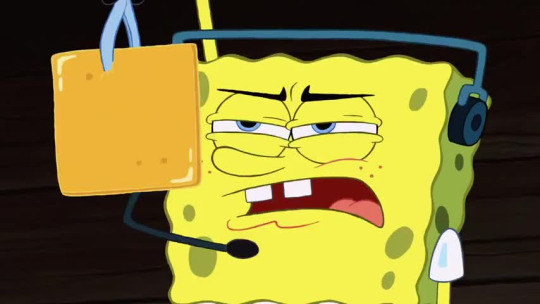
The first scene of the plot is a dream sequence a large crowded scene at the Krusty Krab, with a customer not receiving cheese on his patty, and it being positioned in the same way as a bomb being located. In the dream, everyone is panicked, and Mr. Krabs is visibly distressed, almost like a damsel. Spongebob comes in, announcing his position as manager, much to the relief of Krabs. He goes in, and puts cheese on the burger (again, very akin to a bomb defusal scene), bringing the perturbed customer out safe and sound. Everyone lifts spongebob up as a hero, which is interrupted by his boat alarm.
This scene is JAM PACKED with stuff that both introduces the character to new watchers and introduces the crux of his arc to everyone else. Spongebob of course is very fond of the Krusty Krab, and wants to be the manager- he wants people to see him as cool, and as a responsible adult. He wants to be the sort of person that can be trusted with big responsibilities. And we also see, most importantly, that he is extremely childish through his faximile of what it meant to be adult. Everything is scaled up; it's a very silly situation, which well suits both the joke and his character as an inexperienced kid. This is one of the most direct ways to convey someone's character, because a dream can be interpreted as a direct port into a character's desires. This being the first introduction to the character in the movie sets the tone for EVERY following situation.
In the next few scenes you see Spongebob's real life, which involves his lengthy morning routine; his life is sort of whimsical, and so too is his routine. He showers by shoving a hose into himself till he bursts with water, he uses toothpaste to clean his eyes but not his teeth, and he puts on pants which he must fold to make. Again, all pretty solid jokes, but also very telling about his outlook. He is funny, weird, and childish, which is juxtaposed by the scene where he's- he's uh- showering with squidward. Squidward is an example of the "adult" that spongebob isn't. This has always been the case, but here his normal routine makes it very clear that other people in this world aren't like spongebob. They shower normally, they brush their teeth, they put their clothes on like normal. Spongebob's world is one of wonder and without responsibility, which makes it questionable as to whether he could handle one.
Pictured: Spongebob's room, adorned with childhood imagery
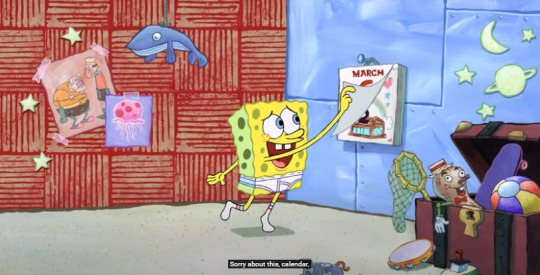
Pictured: Spongebob celebrating his position as a manager, despite Krabs saying that it was squidward who got it
Even his room in this scene screams "kid". He has toys strewn about, glow in the dark stars, and pictures of superheroes on the wall. He even says "Sorry about this calendar" as he rips a page, personifying inanimate objects as a kid would. The movie is telling you, "THIS CHARACTER IS A KID", but in a way that's masked because it's also just a set up for jokes. It's done so well, in my opinion, that it would go over your head because from your perspective you would be laughing along as spongebob did his wacky antics.
On top of that, his excitement for his assured managerial position at the Krusty Krab 2 continues to be bolstered. He marked it off with a cute drawing on his calendar, for those familiar he changes his normal "I'm ready" chant to "I'm ready- promotion-", and he's even already set up a party to celebrate at his favorite chain, Goofy Goobers, a child's entertainment restaurant similar to chucky cheese, albeit replacing pizza for ice cream. He hasn't just gotten excited, but has this childish anticipation for something which isn't even assured.

Spongebob arrives at the opening of the Krusty Krab 2, where he is so excited he can't contain his glee. He breaks the silence and makes members of the crowd uncomfortable, reinforcing again that spongebob is a standout in a world of adults, and a kid who doesn't understand certain social norms, which society looks down upon. When Krabs reveals that Squidward got the managerial position, Spongebob hyped himself so much that he starts celebrating, not even noticing that he wasn't picked. He gets on stage, and begins to give a speech, to which Krabs interrupts.
The next part I think best illustrates Spongebob's clear ignorance to society: Krabs attempts to subtly tell spongebob that he isn't getting the job, but spongebob repeats everything he says into the microphone. Again, fantastic joke, grade A, but the amount this shows how invested spongebob was. He already saw himself as an adult, someone who everyone would look up to as a manager- he could take the responsibility, and isn't aware of everyone likely cringing in the audience. This is the natural step for him in his mind, especially because of his exemplary work which had been previously celebrated through employee of the month awards. This was not an option for him. There wasn't a world in his mind where he would be outclassed by squidward.
Krabs has to break to him that he lacks responsibility, and that his childishness makes it difficult for Krabs to give him such a job. This might seem harsh, but I think the intro again shows how Spongebob saw the job; he didn't understand what it would be like, fantasizing another level in the menial work structure to be an amazing adventure of a job. People in the crowd reaffirm that in the eyes of society, spongebob is just a kid, a goofball. In my eyes, this is a story not just of childhood, but of neurodivergence. Spongebob isn't normal, and is blocked by society for his ignorance of social norms and sunny disposition. He finds things fun that other people can not, and he places values in completely different things. So he is blocked from the meaningful recognition he desired, despite the obvious evidence of his commitment.
I think this is a mighty interesting dichotomy!!! Simultaneously, spongebob's understanding of the world truly is warped, often resulting in a lack of consideration for others as well as harm for himself when things don't go his way, AND he is a good worker which puts in MANY hours of work without so much of a complaint. This is COMPLEX. You have to ask yourself, as a viewer, "would I give spongebob the job?" The answer can be different and can be REASONED.
And that's JUST spongebob! There are other characters with characterization that mixes into the themes of the movie very well, but I'm going to bring up any related points in future sections.
Okay, Okay. So now you're saying "WOW OKAY GREAT so why does any of this matter?" I'm so glad you asked. VERY glad.
2: THE BREAKING OF A YOUNG MAN'S SPIRIT
THIS is the point of the movie. The obstacle in this movie truly isn't adulthood, but instead self doubt. Spongebob's whole world is turned upside down by Krab's rejection of his basic personality. Spongebob asks himself: is it REALLY okay to be who I am? Am I an adult? Is the world fair? One of the most shocking scenes in the movie is blended so well in tone with the rest that you don't really notice; spongebob eating ice cream to cope with his disappointment, akin to that of adults drinking alcohol, and appearing to be visually "drunk" and washed up. This is BRILLIANT, and a recurring theme, where the true line between adult and childhood becomes blurry and impossible to see. Spongebob, the representation of a kid, gets hungover, spiteful, and angry about the injustice of his situation. This is often how adults act in the fact of adversity, but what's funny is that this too is how a kid would act; getting angry and overindulging, feeling entitled and acting socially immature when he didn't get what he wanted. He walks in to the Krusty Krab literally just to shit talk Krabs. And it doesn't stop there.
Pictured: Plankton finding "Plan Z" and looking at it like a centerfold in a playboy magazine
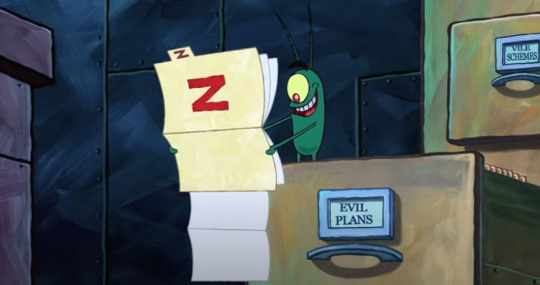
Almost every character in this movie juxtaposes another, again smearing the line of what it means to be an adult. For example, Spongebob and Plankton are polar opposites; plankton is cold and vengeful, angry at the world around him, and spongebob is a happy person who tends not to take things personally, a friend to all. In planktons first appearances in the movie, he is portrayed with clear adult themes, mocking spongebob, making pinup jokes about plan z, and living in a fairly dark and grey space. But, as the story moves along, we see many similarities; both spongebob and plankton are fairly one track minded, and when spongebob's perception is broken he himself gets a little vengeful. When eugene is put in danger over this, though, we do see that he places the lives of others over his own wants. And, even at the end of the movie, we see their similarities. Plankton reuses the "Sorry Calendar" joke that spongebob used at the start of the movie, drawing another line of what it means to be an adult. Is it childish of plankton to say that? Is the inherent irony he has impactful here? His want for something that isn't his, and his disregard for others in pursuing it feels just like how a younger child may steal the toy of another, without understanding what it means to share.
Pictured: Neptune flipping his shit at his lost crown
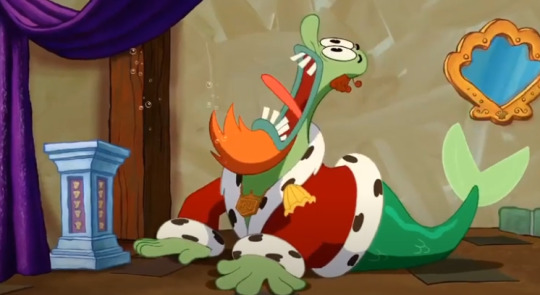
Then, there's the character of Neptune. Neptune is a big man baby. He rules the entire land, commands the most respect, and is considered the most powerful person under the sea, and yet, we see that he gets overprotective of his property, prepared to execute anyone who even annoys him. Throughout the film, he's obsessed with chasing an image of youth, as he is bald, and ignores the suffering of the people on bikini bottom to make sure no one sees his bald head. He throws what's equivalent to a tantrum when he finds his crown is missing, and believes a very crude note written by plankton saying that it was eugene who stole it. His character is an "acceptable" child because he's in a position of power, where spongebob is an "unacceptable" child as he is just a working class member of society. And the funniest part is, that he mocks spongebob for wanting to go for the crown, when even he, the strongest person in bikini bottom, refuses to go out of fear.
We see that these "bastions" of adulthood, plankton and neptune, are the ones who are responsible for missteps of society; we're ALL children in the long run, but the strict enforcement of a perceived true adulthood creates a space where they can act immaturely yet those under them/around them cannot. Dennis makes this case even more, as the only thing he does in this movie is hurt others. There's only one thing that seems to truly denote adulthood, and it's cruelty.
Even squidward, the adult that is supposed to be more responsible that spongebob, refuses to go on the quest to retrieve the crown, as he acts mostly in self interest, even later claiming to only care that plankton was stealing the secret formula as it was hurting his own paycheck.
Spongebob is the only one willing to go, willing to defend the man who wronged him, willing to value life over his own interests. He is both child and adult, just as the adults are too children.
As he moves through the plot of this film, he becomes less confident in his disposition, with his naivete causing moments like him and patrick crossing the state line and immediately getting carjacked, or them being put into an uncomfortable situation by all the bubbles they blew when they tried to get their car back. His bright personality is questioned constantly: Only five days to shell city? BY CAR. This is man's country. But weren't we the double bubble blowing babies?
Pictured: Spongebob caught trying to take back the key to the patty wagon when patrick fails to distract everyone
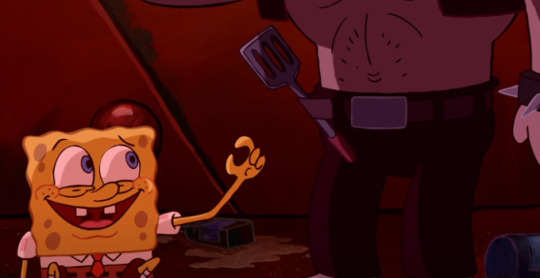
This is made more obvious to him as patrick remains oblivious throughout; patrick is a mirror for him, that acts as a childhood constant, that makes it clearer for him every day the draws of his childishness. There's the moment in the club where patrick's distraction was poorly thought out, and only because he said he wanted to do it adamantly, there's the moment where patrick challenged neptune on how many days they would have to do it, which served no purpose but for his own fun, there's the moment patrick points out the free ice cream trap- he is the unemployed uncritical lens that spongebob is afraid he is.
So everything's fucked, and anyone who is childish is bad i guess!!!
But that isn't so,
3: The illusion of manhood
So we've talked about spongebob's characterization as a naive child, how this is impactful in his transformation into someone who is anxious about that aspect of his personality, and how the society around him is hypocritical in it's own immaturity. But where does this all come together?
Pictured: Planktons dystopian world, which Mindy shows Spongebob and Patrick
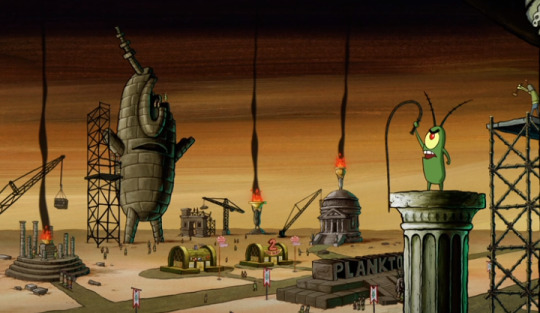
It's at spongebob and patricks "conversion to manhood". At his lowest point, spongebob becomes a squidward- he becomes critical of his AND patricks interests, and regards them as childish, deciding that this means that they can't make it to shell city, as it requires them to be adults. When mindy shows them the dire situation back home, she hopes that spongebob's sunny personality and care for others would shine through, but instead he turns to what society has been telling him; it's impossible. He can't do it, he's just a little kid, and there is no point to any of this as he'll fail regardless.
Thinking about it like this, it truly is one of the darkest points in the entire series; spongebob just openly admitted that there was nothing he could do, that all of his friends were goners because he was effectively useless.
Mindy comes up with an idea; she'll trick spongebob and patrick into believing they're men; she convinces them of mermaid magic (their innocence allowing them to believe) and uses kelp to make them think they've matured into adults. Notice that physical modifiers being the only key to this "fake adulthood". With this, they jump off a cliff because they believe that with adulthood, they are invincible.
This is really telling about how the society they're in thinks of being an adult, and relays that to children. There's another level, a distinct separation between spongebob and adulthood, which seemed like the difference between a squire and a knight- being an adult means that you aren't weak anymore (as though he was weak in the first place), and thus you can do things you never thought before. Is it truly healthy that this is how a society tells kids that adulthood is like, for them to enter the world and feel a truly awful financial and literal hellscape waiting for them? uh, you can, you can decide that for yourself i think.
Nonetheless, they survive the fall, and conclude that they really are invincible, able to power through a ravine with their happy go lucky attitude, eventually befriending the monsters which were once trying to kill them. They weren't acting like adults, but the labels themselves made it possible for them to soldier on with the childlike disposition they had. I find that to be powerful. If we were able to be more hopeful as adults, and power through the worst things brightly, could we do great things? Idk but these depression meds sure do taste good nom nom
After crossing the ravine, spongebob and patrick meet dennis, and have their worldview crushed as it's revealed that they are actually still kids. Dennis being the "alpha male" that he is, is characterized by violence and a lack of morality. The pair are saved by a giant boot, which is the first of two humans in this movie. Spongebob and patrick are both taken by the man in the diver suit, as we fade to black, marking the end of their illusion of adulthood.
4: Back from the Edge (of death)
Spongebob and Patrick awaken in an antique shop, realizing that they were surrounded by fish that had been killed specifically for sale as tacky antiques. They are lifted out of their fishbowl, and put under a heatlamp, as their fate is sealed to become a member among those dead fish. In spongebob's final moments, he mourns his inability to be an adult, as well as to reach shell city; but before they both die, patrick points out that they truly did reach shell city, as the crown was within their reach.
This. This is a phenomenal scene. Why? Because of what it means for spongebob's arc.
Pictured: Spongebob and Patrick on their deathbeds, finding happiness

He sees the crown, and realizes that, unequivocally, that even if he didn't bring the crown back, he made it to shell city. Every person he met told him that he couldn't even do that. and he did it. He is a kid, yes, but he's a kid who went where not even NEPTUNE dared go. Everything people said about him, about how him being a kid stopped him from success, was suddenly shattered. He has been asking himself if it's okay that he is a kid, and he saw, unambiguously, that it is. He is allowed to be happy. He can enjoy things that other people don't. He can be naive. He can be himself, no matter what anyone says. And so can you. Great things can be done by people who are "childish", who are "naive", who are kind without expecting a return, all of it. YOU are okay. Your stims are okay, your comfort series are okay, your interest in tropes are okay, YOU'RE OKAY!!!!
with that, spongebob and patrick are dehydrated on the table, and ostensibly die, the kids that they are, shedding one final tear each, forming a heart beneath them.
...
Miraculously, the tear electrocutes that lamp at it's socket, causing smoke to rise and set off the sprinklers, rehydrating the pair, and bringing them back to life. The "Man in the Suit" attempts to capture them, seeing them about to lift Neptune's crown, but the rest of the dehydrated fish come back to life- squirting him with his own glue and beating him to the ground, as spongebob and patrick run out with the crown. David Hasselhoff offers them a ride back to Bikini Bottom, and the pair begin their ride back.
5: The confrontation of Adulthood and Childhood
Pictured: Dennis looking all lame and shit
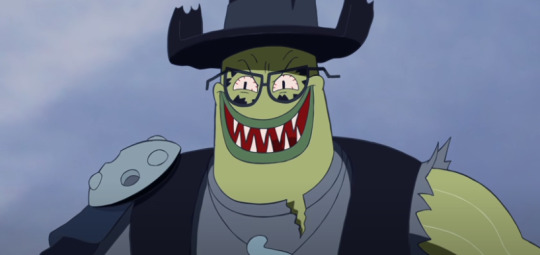
As spongebob and patrick are being swam back to bikini bottom, the boot under which dennis was crushed rockets to Hasselhoff, spitting him back out to finish the job. The appearance of Dennis, IN MY OPINION, makes him look rather goofy, with his broken glasses making him look more like a office worker than a badass assassin as he attempts to kill spongebob and patrick. Spongebob, in trying to reason with him, is able to ruin his eyes with bubbles, and then survives as dennis gets hit by a raised platform which spongebob and patrick are too low to be hit by.
Having defeated one representation of adulthood, spongebob and patrick are shot down by HasselHoffs MASSIVE MAN TITS with the crown in order to prevent Krab's fate, blocking Neptune's lazer just in time as they crash in.
All seems to be well, but plankton uses one of his mind control helmets (which we'll be getting into later) to enslave even Neptune, putting mindy, spongebob, patrick, and Krabs against the wall.
In another stark moment of characterization, Spongebob tells patrick that "Plankton Cheated", which prompts plankton to tell spongebob that the situation wasn't a kiddy game, and that it was the real world. This sort of distinctions in their ethos tell you how spongebob interacts with justice; he believes in "playing fair", while plankton is bitter and believes in getting what he wants.
Finally, the apex to our plot, is a musical number. Spongebob begins to make a long-winded speech, where he takes ownership of every label he was called as he stood on the stage at the beginning, the similarity between the two events being clear (holding a microphone at an inappropriate time, making a speech as he blocks out input from an adult trying to talk him down). Spongebob then busts out into the film's rendition of Twisted Sister's "I Wanna Rock", "I'm a Goofy Goober". This results in spongebob reversing plankton's whole plot with "the power of rock and roll". Plankton is made powerless, and thrown into a little padded cell.
The final scene in the movie has Mr. Krabs freed from his imprisonment in ice, and spongebob is offered squidwards position as manager of the second Krusty Krab. He seems hesitant, and squidward offers an insightful analysis of what spongebob might be feeling (the typical analysis of a coming of age movie, where the protagonist finds out that what they wanted all along is not what they wanted, but it was what was inside all along). Spongebob refutes that squidwards fly was just down, and GLADLY accepts the job.
AND THAT'S THE MOVIE
6: AN INVERSION ON THE COMING OF AGE GENRE
A coming of age story tends to be one which is focus on the growth of a character from childhood to adulthood, asking questions about what it means to be an adult. A character reaches for their perceived adulthood, and realizes what it means to ACTUALLY be an adult, typically juxtaposing what people think (drugs, parties, sex) versus what the movie postures as the correct adulthood (responsibility). In this, I think that the spongebob movie directly criticizes the position of what "an adult" is, in the sense of how someone acts.
Like we discussed in part 2, every adult character in this movie tends to be very childish in themselves, unable to see through simple ruses, and often very possessive of personal property. I don't think we actually see a child in this movie as a speaker at any point, only really as background characters (in goofy goobers to solidify spongebob as childish, and I believe in the chum bucket as they're lead to an unsafe place by their parents, who are supposed to be responsible). Thus, what is mostly examined is how adulthood and childhood is a very thin line. Squidward, for example, going directly to plankton to accuse him of stealing the formula, instead of taking it to the top immediately, which would have ended this whole thing fairly quickly; that was rather silly, and was the fruit of his need to assert himself as an adult.
Spongebob goes through this movie FIRST not caring much about whether or not he was an adult, and it is only after the social pressure from adults does he start to chase it. He then chases his perceived image of an adult, going on an adventure, and is crushed by the fact that he isn't an adult. Instead of finding what an adult is, he instead becomes comfortable with his existence as a child, finding himself at the end of the movie able to comfortably chase after an ideal again, where in a normal movie he would humbly reject the job he was offered.
This is, truly, what we should all take from this film. Spongebob realizes that people who aren't necessarily socially adjusted or acceptable can do great things, regardless of what the people around them say, especially because the people around them are liable to throw tantrums and be actively harmful to society. He is allowed to find comfort in childish things, and to be naive, because the world needs more people willing to help others. It's a scathing criticism on the imposed adulthood that exists in a lot of coming of age films, which begs us to drop fun in the interest of doing the right thing, as though those two ideas are contradictory.
BONUS: EXTRA STUFF THAT I LIKED
The goofy goober song became really good storytelling, at first marking childishness, then marking a level of discomfort and judgement in the club, then marking spongebob recognizing that his happiness came from what he liked and not some vague idea of adulthood, and finally marking his full acceptance of his childishness, taking the form of rock, the music of rebellion. It's not as subtle as leitmotifs, but it works really well in how the same song can give very different feelings throughout, and inform how we interact with a story.
There are a lot more examples of adults being pressured into childishness, with the connected twins who liked goofy goober at the club, who were beaten senseless for absolutely no reason, which highlights the way that the society hurts people that, by all means, are just as much adults as anyone else. There's of course Plankton's helmets which created a society of people who simply slaved away with nothing to say, taking life as it came and listening to authority.
On top of that, this movie is PRETTY ANTICAPITALIST AND ANTIMONARCHY, despite those things being allowed to continue to exist at the end- monarchy is seen misusing power constantly and often for unfounded reasons, and Spongebob's diligence at work is rejected by a penny pinching Krabs, who cares only about money. Like, THE KRUSTY KRABS ARE RIGHT NEXT TO EACH OTHER? THAT IS SOME MONTY PYTHON ASS SHIT. This year is the first year i laughed at that joke, because it's really some "capitalists are fucking dumb as shit" humor that slipped over my head when i was a kid. The villain literally being defeated by Rock and Roll, which was sung with a message against the oppression of differences in people? Yeah, I think the spongebob movie hated rich mother fuckers.
END: UH YEAH THAT'S WHAT IT IS
So yeah. The movie is good I think. There's a lot more i could go into, but I've been writing this post for hours and at this point i haven't even read it so...
I recommend going back and giving this film a rewatch!!! Pay attention to all the moments where adults act like children/kids act like adults, because it'll make ur brain pop like a zit. Anyways that's me, I'm Jericho Jay "Japes" Marshall, and I HATE facism.
27 notes
·
View notes